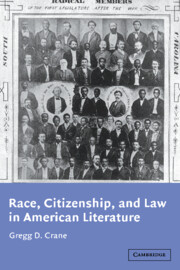Book contents
- Frontmatter
- Contents
- Acknowledgments
- Introduction
- Chapter 1 Higher law in the 1850s
- Chapter 2 The look of higher law: Harriet Beecher Stowe's antislavery fiction
- Chapter 3 Cosmopolitan constitutionalism: Emerson and Douglass
- Chapter 4 The positivist alternative
- Chapter 5 Charles Chesnutt and Moorfield Storey: citizenship and the flux of contract
- Notes
- Index
Chapter 4 - The positivist alternative
Published online by Cambridge University Press: 22 September 2009
- Frontmatter
- Contents
- Acknowledgments
- Introduction
- Chapter 1 Higher law in the 1850s
- Chapter 2 The look of higher law: Harriet Beecher Stowe's antislavery fiction
- Chapter 3 Cosmopolitan constitutionalism: Emerson and Douglass
- Chapter 4 The positivist alternative
- Chapter 5 Charles Chesnutt and Moorfield Storey: citizenship and the flux of contract
- Notes
- Index
Summary
To appreciate fully the higher law arguments of Douglass, Sumner, and Emerson, we have to consider the positivist rejoinders of opponents and some allies. A wide variety of Northern and Southern intellectuals, authors, jurists, and politicians found in the very existence of slavery, war, class and race domination ample proof that neither conscience nor consent but power actually structures and organizes law and society. Northern judges deeply convinced of slavery's immorality, for instance, set aside their own higher law scruples as irrelevant to the professional duty of the judiciary to enforce the political will of the majority expressed in legislation:
Slavery is wrong, inflicted by force and supported alone by the municipal power of the state or territory wherein it exists. It is opposed to the principles of natural justice and right, and is the mere creature of positive law. Hence, it being my duty to declare the law, not to make it, the question is not, what conforms to the great principles of natural right and universal freedom – but what do the positive laws and institutions command and direct.
The antebellum judiciary's thoroughgoing legal positivism (taking its name from the superior position of the lawmaker and defining law as the rule a superior lays down to an inferior) was just one expression of a general nineteenth-century suspicion that coercion was the governing principle of human associations.
We find this positivist intuition animating the fiction of the “old Southwest Humorists.”
- Type
- Chapter
- Information
- Race, Citizenship, and Law in American Literature , pp. 131 - 182Publisher: Cambridge University PressPrint publication year: 2002

